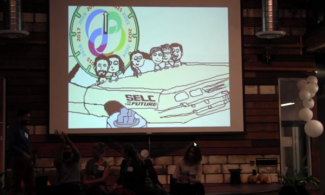In this post I am going to give my summary of what I think John McNamara is trying to convey in his recent series on his blog, The Workers' Paradise. In my first post on his series I focused on the differing but inseparable approaches?structural and educational?to bringing the cooperative movement to scale.
Problems and opportunities
I believe that John sees the possibility of big opportunities coming the way of the cooperative movement:
As organics become more popular, a lot of people are coming to co-operatives without any co-op awareness?I think that this is a good problem to have! Imagine the opportunity of reaching out to 20,000 and teaching them about the co-operative economic model. At 50,000, we could almost start seeing the co-operative model being discussed in local elections as a means of solving the City's problems. Imagine if half the city of Madison joined a co-op and the City's Planning Department started seeing co-ops as a viable means of delivering services?
It is very important, in my opinion, to understand that McNamara is very strong on the possibility of the cooperative movement being able to move to scale. But he wisely directs our attention to the big problems this is going to bring, problems that are already burdening cooperatives. The primary one he refers to is ?the agency problem? (which is pretty much what I mean by ?top/down problem?). By this I think he is referring to situations where a coop (consumer or worker) becomes so large that members no longer directly manage the business, but have set up ?agents? such as managers and board of directors to carry out those roles.
At this point a cooperative ?can easily succumb to the dominant paradigm of capitalism.? Managers manage and directors direct with less and less awareness and connection with the workers and/or the membership. If it tends to go that way, then the principal members of a co-op (the ?members? of a food coop or the worker cooperators of a worker co-op, for example) may still own the business, but they aren?t running it. He says:
Even Mondragon can create an environment where mental and physical labor has separate value within the organization. We are not immune from creating agency theory. If our Human Resource department only has the corporate world of human resources to use for educating itself, it shouldn?t be a surprise that our HR departments talk and act like other corporations. Unless we create a structure that either flattens hierarchy or contains and channels its power, we are susceptible to it overcoming our democracies. If Mondragon cannot eradicate it despite their principles and culture, then it will be doubly hard for our US Co-ops. (Emphasis added.)
Remedies
John draws on the distributionist tradition in England, the syndicalist movement, and Mondragon to fashion some basic remedies. (As you read my summary take into account that I am generalizing both to worker and consumer coops for the sake of space.)
One, ?we need education programs with a constant focus on how we are different? and we also need to create incentives for people to participate in them.? (Emphasis added.)
Two, ?we need to create the social committees?real syndicalist functions within our co-operatives?They need to educate people on their history as a worker in addition to the former educational process of the co-operative. They need to create solidarity among the entire workforce (not against management or any other group, but among all those who work including the leadership) and they need to be the voice for the workers while the board speaks for the members and management speaks for the business.? (Emphasis added.)
(I especially like the way in which John clearly identifies three distinct voices within a large consumer or hybrid cooperative: the workers, the members, and the business.)
Third, ?Economic movements cannot relegate themselves to being merely social movements. They must also be political movements.? He gives a riveting image of what this would look like:
In Haiti, after the earthquake, the proposals for rebuilding came from the usual neo-liberal sources with former US President Bill Clinton invoking their anthem: ?Don?t let a good disaster go to waste.? In the rebuilding of Haiti, the discussion in the press was about privatizing government controlled businesses and services. Where was the worker co-operative plan for rebuilding the country along a democratic worker friendly economy? Well, it doesn?t exist yet. (Emphasis added.)
Here?s another more local one:
A couple of years ago, I asked Madison Mayor David Cieslewicz why co-operatives aren?t even mentioned when the city discusses development plans. He said, because you don?t show up. (Emphasis added.)
(Looking back at my summary of McNamara?s remedies, I would say that the amount of space I gave to the his education and structural remedies reflect the attention he gave them fairly well. I have given more weight to his political remedy. I really liked them.)



Add new comment